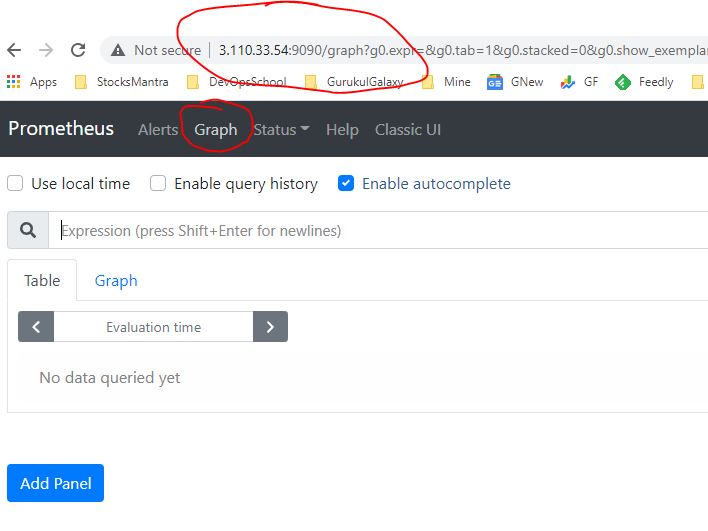The expression browser is available at /graph on the Prometheus server, allowing you to enter any expression and see its result either in a table or graphed over time.
This is primarily useful for ad-hoc queries and debugging. For graphs, use Grafana or Console templates.

Using the expression browser
As you can gather from localhost:9090/metrics, one metric that Prometheus exports about itself is named prometheus_target_interval_length_seconds (the actual amount of time between target scrapes). Enter the below into the expression console and then click "Execute":
-------------------------------------------
prometheus_target_interval_length_seconds
-------------------------------------------
This should return a number of different time series (along with the latest value recorded for each), each with the metric name prometheus_target_interval_length_seconds, but with different labels. These labels designate different latency percentiles and target group intervals.
If we are interested only in 99th percentile latencies, we could use this query:
-------------------------------------------
prometheus_target_interval_length_seconds{quantile="0.99"}
-------------------------------------------
To count the number of returned time series, you could write:
-------------------------------------------
count(prometheus_target_interval_length_seconds)
-------------------------------------------
Using the graphing interface
To graph expressions, navigate to http://localhost:9090/graph and use the "Graph" tab.
For example, enter the following expression to graph the per-second rate of chunks being created in the self-scraped Prometheus:
-------------------------------------------
rate(prometheus_tsdb_head_chunks_created_total[1m])
-------------------------------------------
Experiment with the graph range parameters and other settings.Configure Prometheus to monitor the sample targets such as Node Exporter
Example queries that aggregate over thousands
Though not a problem in our example, queries that aggregate over thousands of time series can get slow when computed ad-hoc. To make this more efficient, Prometheus can prerecord expressions into new persisted time series via configured recording rules. Let's say we are interested in recording the per-second rate of cpu time (node_cpu_seconds_total) averaged over all cpus per instance (but preserving the job, instance and mode dimensions) as measured over a window of 5 minutes. We could write this as:
-------------------------------------------
avg by (job, instance, mode) (rate(node_cpu_seconds_total[5m]))
-------------------------------------------
Latest posts by Rajesh Kumar (see all)
- Apache Lucene Query Example - April 8, 2024
- Google Cloud: Step by Step Tutorials for setting up Multi-cluster Ingress (MCI) - April 7, 2024
- What is Multi-cluster Ingress (MCI) - April 7, 2024

